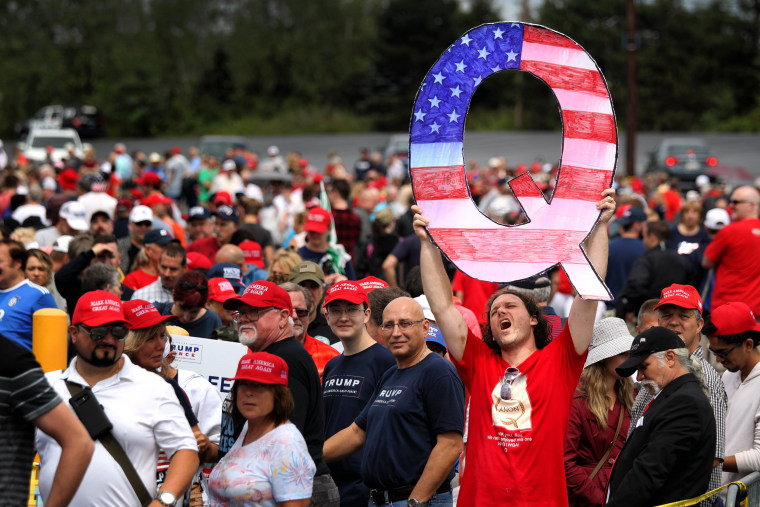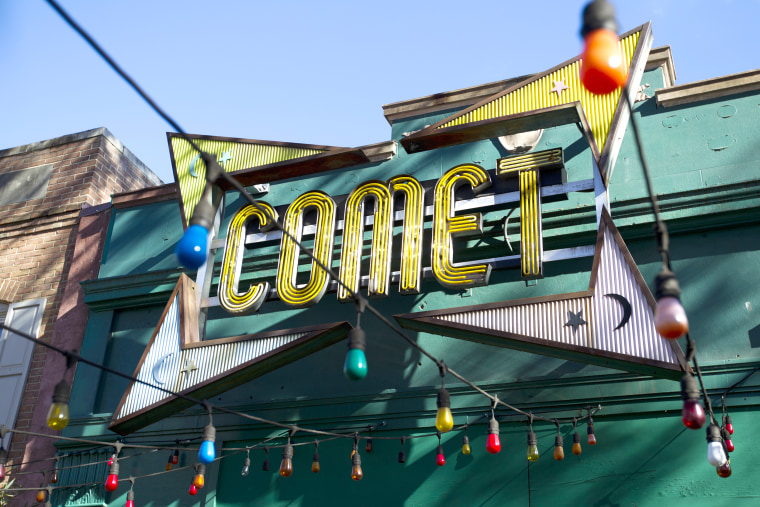As investigators search for the man who they say set a small fire last week at D.C.-area pizza shop, Comet Ping Pong, followers of the debunked “pizzagate” conspiracy theory have been speculating about what was “really” behind the blaze.
“To destroy evidence or vengeance? I hope the latter,” a user wrote on the public Facebook group “PizzagateUncompromised,” one of hundreds of comments in dozens of Facebook groups dedicated to the conspiracy theory.
In one group, users responded to news that Comet pizza was on fire with gifs of people eating popcorn. Others just celebrated.
“Burn baby burn that evil place of debauchery of children, torture and murder down,” one user wrote.
Pizzagate — which alleged that Hillary Clinton and prominent Democrats ran a child sex and sacrifice ring out of the pizzeria’s basement — has mostly waned since its nadir in December 2016, when a North Carolina man on a mission to rescue imaginary children fired several shots from an assault-style rifle inside the restaurant. Eclipsed by a related conspiracy theory, Qanon, pizzagate has decreased in popularity in part due to crackdowns by online platforms. Reddit banned the pizzagate groups in 2016 and YouTube recently announced a commitment to stop recommending conspiracy videos.

But they still have a home on Facebook.
In over 30 different open and closed Facebook groups, boasting more than 40,000 collective members, pizzagate followers have kept the conspiracy alive. In the face of reason, these pizzagate adherents have held tightly to “evidence” — mostly what they allege is coded language and symbols that link shapes to pedophelia and food products like cheese and pasta to children.
The members post misinformation and wild allegations linking just about anyone to a world-wide pedopehila ring. Their targets have included everyone and everything from local businesses to Tom Hanks to a random Facebook user wearing a t-shirt with the image of a slice of pizza on it. This week, a major topic of conversation has been Celine Dion’s weight loss, which group members falsely attributed to an addiction to Adrenochrome, a real chemical compound that pizzagate conspiracists claim is “harvested” from tortured children, and taken by the political and Hollywood elite to get high.
None of this is borne out by any evidence to be true in any way.
In 2018, Facebook CEO Mark Zuckerberg announced the platform was refocusing the Newsfeed so that users would see less content from media and brands and more from their friends, family and groups. For the majority of Facebook users, that meant more posts from local parent collectives, spread out family groups, or like-minded hobbyists.
For the more conspiratorial user, it can amount to a curated cult.
It’s not merely the existence of pizzagate-like conspiracy groups, but the mechanisms by which Facebook serves them up, that can radicalize users, said Renée DiResta, a researcher of disinformation online and director of research at New Knowledge.
Joining a Facebook group tells Facebook to suggest other groups and pages related to the topic.
“If you like something, it will show you more of that,” DiResta said. “So belonging to gardening groups will make Facebook suggest to you more gardening groups.”
Facebook’s suggestion algorithm also infers commonalities between users and other members of groups that user joins.
“In a healthy way, this may mean Facebook is saying ‘If you like gardening, maybe you also like cooking,’” DiResta said. “In the case of conspiracy content, Facebook’s recommendation engine says, ‘If you like pseudoscience, I’ll show you chemtrails and flat earth.’”
“Because of the increase of ominous conspiracies, you’re seeing groups around these conspiracy theories like QAnon or pizzagate being referred to people who would never search for them in the first place.”
As an example, for users who find their way into a pizzagate interest group named after Hillary Clinton’s campaign chairman, John Podesta — whose stolen emails are misread in a way to inform much of the Pizzagate conspiracy — a right rail labeled “Suggested Groups” includes the group “Pizzagate Reports,” the header image for which is prominent Democrats including Hillary Clinton and Barack Obama and George Soros, photoshopped with glowing red eyes in what appears to be a Satanic ritual.
Similarly, users visiting the private group “Pizzagate,” topped with an image that points to Comet’s owner James Alefantis as the ringleader of a child sacrifice ring — are pushed to join other fringe groups including, “Real UFO Sightings & Strange Phenomenon,” “Official Flat Earth & Globe Discussion,” and “Q Angels,” a group dedicated to an unfounded conspiracy theory involving Donald Trump and a secret war against a cabal of alleged child abusers.
“We are working to build a more informed community and reduce the spread of misinformation through our False News policy," a Facebook spokesperson said in a statement to NBC News. "We know there’s still work to be done and we recognize that helping people stay informed without stifling productive public discourse is a challenging and sensitive issue. For these reasons, we don't remove false news from Facebook but instead, significantly reduce its distribution by showing it lower in the News Feed.”
In a July interview with Recode editor Kara Swisher, CEO Mark Zuckerberg defended the practice of letting conspiracy groups remain, but acknowledged Facebook’s responsibility to take down misinformation that could induce violence.
Alefantis told The Washington Post that the shop still regularly gets harassing phone calls, a practice discussed in several of the pizzagate Facebook Groups.
“At first [the manager] said I was making him physically shake and now he just listens to me until he finally hangs up. He never really answers or addresses my concerns. But I still call. Once a day, every day,” one woman wrote last year under a post about her efforts to call Comet regularly.
“Love it!! Lol get em,” another user responded.

